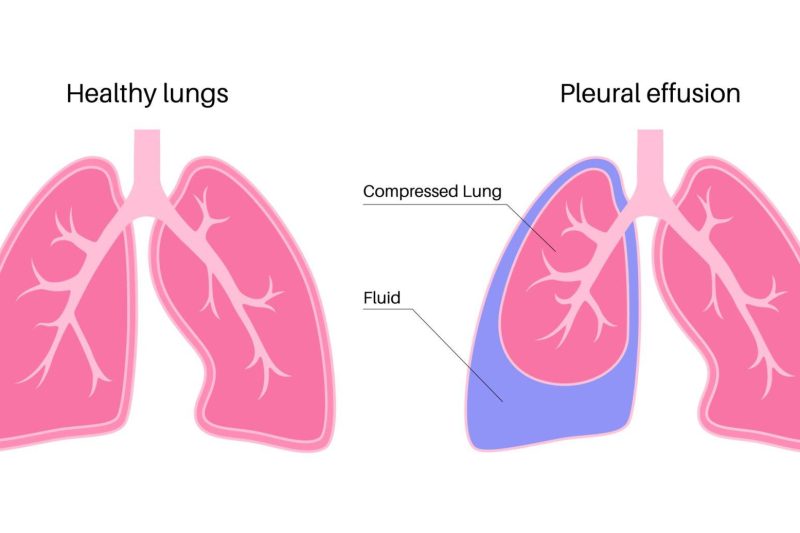What are the Different Stages of Esophageal Cancer?
Esophageal cancer is a formidable disease that affects the esophagus, the hollow tube that carries food and liquids...
+919999461292
MBBS | DNB (General Surgery, Gold Medalist) | DNB (Thoracic Surgery, Gold Medalist)
Thoracic & Lung Transplant Surgeon | Medanta – The Medicity, Gurugram

MBBS | DNB (General Surgery, Gold Medalist) | DNB (Thoracic Surgery, Gold Medalist)
Thoracic & Lung Transplant Surgeon | Medanta – The Medicity, Gurugram


Multi-loculated pleural effusion is a complex form of pleural effusion, where fluid collections with separate compartments, or “locules,” are formed within the pleural space. This condition often results from ongoing inflammation due to infections like pneumonia, tuberculosis, or post-surgical complications. The presence of loculations can make treatment more challenging due to the difficulty in draining the fluid through standard thoracentesis. Patients typically present with symptoms such as chest pain, fever, and difficulty breathing, which are indications for prompt medical assessment. Diagnostic imaging, including ultrasound, CT scans, or MRI, is used to visualize the extent and nature of the effusion.
Treating a multi-loculated pleural effusion usually requires a more aggressive approach than a simple pleural effusion. Therapeutic options may include the use of intrapleural fibrinolytics to break down loculations and facilitate drainage or more invasive surgical interventions. Video-Assisted Thoracoscopic Surgery (VATS) is often employed, allowing for the insertion of a camera and instruments into the chest to break down the locules and remove fluid directly. This approach aims to clear the pleural space, alleviate symptoms, and treat the underlying cause of effusion. In severe or recurrent cases, a decortication, which removes the restrictive layer of inflamed tissue encasing the lung, may be warranted to restore lung function fully.
For individuals diagnosed with multi-loculated pleural effusion, consulting a specialist in thoracic surgery is crucial. An expert like Dr. Mohan Venkatesh Pulle can provide a comprehensive evaluation and tailor treatment plans that address the specific needs of the patient, leveraging his extensive surgical expertise to offer the best possible outcomes.
See, Pleural Effusion is when excess fluid collects between your lung and chest wall. Think of it like water collecting in a plastic bag around your lung. This fluid prevents lung expansion and causes breathlessness.
There can be several reasons – most common are tuberculosis, chest infections. It can be due to heart problems or kidney issues. Sometimes it’s due to cancer also. We’ll need to do proper tests to find the exact cause in your case.
Well, seriousness depends on underlying cause and amount of fluid. Small effusions might resolve on their own, but larger ones need treatment. Don’t worry too much – we have very effective treatments available.
If fluid is causing breathing difficulty or if we need to test it, yes, we’ll need to drain it. We do this through simple procedure called thoracentesis. It’s quite safe and gives immediate relief.
Well, the treatment depends upon the cause of the effusion. As an initial investigation, a sample of fluid is drawn out from the chest through the needle and is sent for various investigations. INo, usually not permanent. Once we treat underlying cause and drain excess fluid, condition improves. But you’ll need regular follow-up to prevent recurrence.
Most patients stay 3-5 days, depending on treatment needed. If we’re just doing fluid drainage, might be shorter. If you need more treatment, might be bit longer.
Initially, yes. You might feel breathless with activity. But after treatment, most patients return to normal activities. We’ll guide you on gradually increasing activity levels.
Watch for increased breathing difficulty, chest pain, fever, or if you feel more tired than usual. If you notice any of these, contact us immediately.
Prevention depends on underlying cause. We’ll give you specific instructions based on what caused your effusion. Generally, staying active, maintaining healthy weight, and regular check-ups help
We’ll need chest X-ray, CT scan, and analysis of fluid we remove. Sometimes we might need few more tests to find root cause. Don’t worry, we’ll explain each test properly.
Well, the treatment depends upon the cause of the effusion. As an initial investigation, a sample of fluid is drawn out from the chest through the needle and is sent for various investigations. INo, usually not permanent. Once we treat underlying cause and drain excess fluid, condition improves. But you’ll need regular follow-up to prevent recurrence.
Light walking is good, but avoid strenuous exercise until we clear you. We’ll help you plan exercise program based on your recovery.
Eat healthy, balanced meals. If heart problem is cause, you’ll need low-salt diet. If kidney issue is there, we’ll give specific diet plan. Staying well hydrated is important.
“Yes, regular follow-up is important to monitor your condition. Initially every week, then monthly, and later as needed. This helps prevent recurrence.”
Main things are – quit smoking if you smoke, maintain healthy weight, stay active, take medicines regularly if prescribed, and don’t miss follow-up appointments.
Note: “Remember, each patient’s condition is different. These are general guidelines, but we’ll make specific plan for you. Don’t hesitate to ask questions – I’m here to help you understand and recover better.”
Esophageal cancer is a formidable disease that affects the esophagus, the hollow tube that carries food and liquids...
Esophageal cancer is a formidable and often challenging disease that affects the esophagus, the muscular tube that carries...
Esophageal cancer is a challenging and potentially life-threatening condition that requires timely diagnosis and appropriate treatment. When esophageal...
Esophageal cancer is a serious and potentially life-threatening disease that affects the esophagus, the muscular tube that carries...
Esophageal cancer is a formidable adversary that can silently develop within the esophagus, the muscular tube connecting the...
Esophageal cancer is a serious and potentially life-threatening condition that affects the esophagus, the muscular tube responsible for...
MBBS | DNB (General Surgery, Gold Medalist) DNB (Thoracic Surgery, Gold Medalist)
Thoracic & Lung Transplant Surgeon
Medanta – The Medicity, Gurugram
An esteemed thoracic surgeon, excels in minimally invasive procedures (VATS & Robotic surgery) for both benign and malignant lung conditions. With a stellar academic background and international training, he is dedicated to offering compassionate and expert patient care.

Website designed and Developed with ❤️ by GigaWebZone
Copyright © 2023 All rights reserved.
WhatsApp us